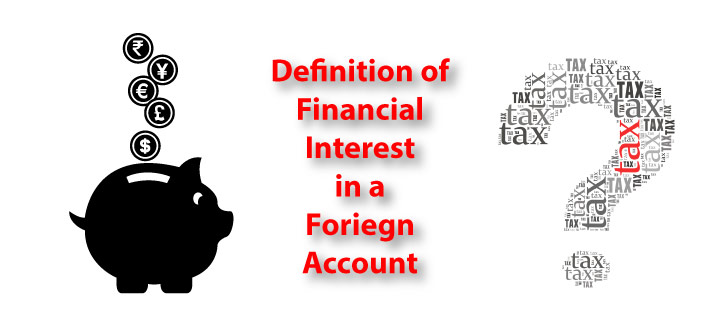FBAR Definitions of Foreign Account and Financial Interest
FBAR requires reporting with respect to financial accounts “in a foreign country,” where “foreign country” defined as “all geographic areas located outside of the United States” (1). Hence, an account is considered “foreign” for the purposes of FBAR filing if it has a geographical location outside of the United States. The nationality of the financial institution is not relevant to the “foreign account” determination, such that a foreign branch of a U.S. institution may be reportable, whereas a U.S. branch of a foreign bank will not be reportable.
What is a Financial Interest for the Purposes of FBAR Reporting?
Under FBAR regulations, any person with “financial interest in” or signatory authority over a foreign account that complies with the reporting requirements of the statute (2). Financial interest is defined by the FBAR statute in several ways. First, a person has a financial interest in a foreign account when the person is the owner of record or has legal title whether the account is maintained for his own benefit or for the benefit of others (3). Thus, a U.S. person who has a foreign account must file FBAR, even if the account is maintained for the benefit of someone else. The code also clarifies that if the account is in the name of more than one person, all parties to the account are considered to have a “financial interest” for the purposes of FBAR reporting obligations (4). Along the same lines, a U.S. person who is appointed to the account of another person as “an agent, nominee, attorney or in some other capacity on behalf of” the U.S. person is considered to have a financial interest in the account.
There are additional categories of accounts for which a U.S. person is considered to have a financial interest for the purposes of FBAR reporting. These accounts, when held in the name of another person, can create a financial interest in another person if the owner of the account falls within any of the following categories: 1) a corporation in which the U.S. person owns more than 50 percent of the company’s stock; 2) a partnership in which the U.S. person receives profits or capital exceeding 50 percent; 3) a trust in which the U.S. person is an owner of any part of the trust; 4) a trust in which the U.S. person (1) “has a present beneficial interest in more than 50 percent of the assets” or (2) “receives more than 50 percent of the current income;” and 5) an entity in which the U.S. person “owns directly or indirectly more than 50 percent of the voting power, total value of the equity interest or assets, or interest in profits,” other than a corporation, partnership, or trust (5).
Finally, the FBAR regulations also require a U.S. person to report on any entity that was created for FBAR avoidance purposes. According to the statute, a U.S. person that “causes an entity…to be created for a purpose of evading” FBAR reporting is considered to have a financial interest in any account “for which the entity is the owner of record or holder of legal title” (6). However, the anti-avoidance rules do not apply to U.S. persons who make a good faith effort to comply with FBAR but fail to do so.
How a Tax Attorney Can Help with FBAR Reporting
Individuals with foreign assets and bank accounts have been under increased scrutiny in recent years. In addition to reporting foreign income, taxpayers must take the important step of filing an FBAR form in order to avoid penalties and fines. If you have questions about the filing requirements and potential tax implications of your foreign accounts, it would be wise to seek the counsel of an experienced tax attorney.
The Tax Lawyer - William D. Hartsock has been successfully helping clients with tax issues related to their foreign assets since the early 1980s. Mr. Hartsock offers free consultations with the full benefit and protections of attorney client privilege to help people clearly understand their situation and options based on the circumstances of their case. To schedule your free consultation simply fill out the contact form found on this page, or call (858) 481-4844.
References:
- 31 CFR § 1010.350(a).
- 31 CFR § 103.24(a).
- 31 CFR § 1010.350(e)(1).
- 31 CFR § 1010.350(e)(1).
- 31 CFR § 1010.350(e)(2).
- 31 CFR § 1010.350(e)(3).



Comments (0)